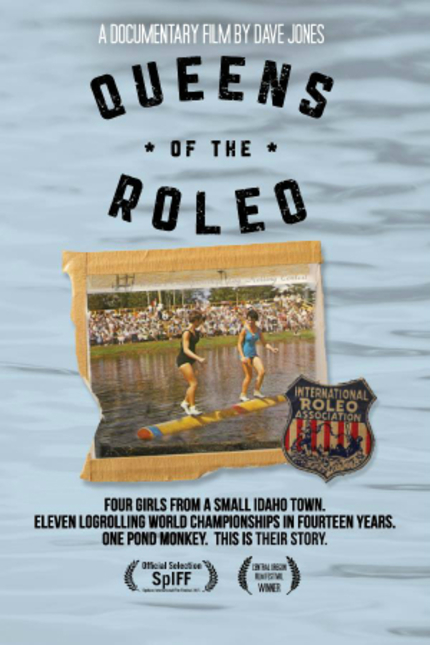Spokane 2015 Review: The QUEENS OF ROLEO And Their Pond Monkey King

From 1958 to 1972, the small rural town of Lewiston, Idaho produced four Queens Of Roleo; women who reigned supreme in the sport of logrolling, and who together accounted for 11 World Championships in just 14 years. This would be an impressive sporting legacy under any circumstances, but for a remote rural town - with a population of barely 20,000 at the time - it is outright astonishing.
First time documentary director David Jones, an Oregon newsman by trade, stumbled upon the story and immediately declared someone just had to investigate how this happened. When nobody took up the challenge, Jones decided to get to the bottom of it all himself, and at the bottom is where he found Roy Bartlett, a self-proclaimed "pond monkey."
Bartlett, now in his eighties, began his logrolling career like most, working to disentangle and clear floating logs for the timber industry. Felled forest was historically ditched into rivers where the timber would be floated downstream, inevitably becoming congested and stacking into blockages. The pond monkeys' task was to loosen these logs up, using poles to push and lever them apart, all the while standing on other logs bobbing anchorless in the water. Naturally this was treacherous work, so to sharpen his skills Bartlett would compete on practice logs in a pool, and this was where young Bette Ellis would come to play.
Female logrollers were traditionally on the hefty end of the spectrum, given the labor intensive nature of timber work, but Ellis was so quick and light on her feet that her heavier opponents simply couldn't keep up. Sensing her potential, Bartlett took her training upon himself, and so began his incredible legacy as a coach of logrolling champions. He remained a bastion of the sport for decades, coaching Bette Ellis, Barbara Peterka, Cindy Cook, and Penni McCall to multiple world championships, as well as hundreds of other children for sheer joy of the sport, all without ever taking a dime.
The film contains some incredible archival footage of logrolling competitions and prowess. This was once a popular sport, filling grandstands with crowds who would watch with riveted attention once the action commenced. To witness the speed and dexterity of these men and women as they tried to out-muscle, out-smart, and out-run each other on logs spinning up a spray is nothing short of mesmerizing. It's fast, it's fearless, and when it ends it ends in an instant (and with a splash).
Three of the four world champs were in attendance at the festival, as well as Roy Bartlett, who regaled the audience with stories in a venerable brogue. All the ladies still bore the marks of their glory; scars from the spiked shoes they wore to assist in, you know, running and stopping and reversing and hopping on top of a spinning, drifting, floating tree trunk. They also reiterated in person a strong and quite moving theme of the film; that these events had been largely forgotten by the stars as their lives had moved on, and how joyful the experience of remembering and reuniting had been.
Bartlett's experience was more bittersweet, though no less joyful in reminiscence. The timber industry was eventually shut down by environmentalist pressure, and with it the supply of timber that a local mill had long donated for his classes. Bartlett persevered, but as the industry moved on so too did the cultural interest in timber sports. Bartlett has finally retired, and without his devoted service the log rolling legacy in Lewiston had dwindled into obscurity.
That a little film like Queens Of Roleo was given opening night attention is testament to the value of localized film festivals. The Spokane International Film Festival (SPIFF) may not garner the same attention as its more prominent and prestigious counterparts, but the freedoms of lesser limelight mean more opportunities to showcase smaller films that can pack a powerful local punch. Since it's inception, SPIFF has consistently shone their spotlight on regional films about the northwest US. The opening night pairing of Queens Of Roleo with another local gem, Dryland (reviewed here), at the gorgeous Bing Crosby Theater no less, represents another important contribution to the preservation of regional culture and history.
We can hope that Queens Of Roleo will pique renewed local interest in the sport of logrolling, though without someone to fill Bartlett's shoes a full revival seems unlikely. However, the telling of the tale is sufficient reward in itself, securing for posterity the inspiring story of four women who broke the mold, and the gentleman who inspired them to do so. Some successes are destined to enjoy only an ephemeral stage, but for a while there Roy Bartlett's pool in little Lewiston, Idaho was the very epicenter of logrolling in the entire world.
And that proved to be a story well worth the telling.

Do you feel this content is inappropriate or infringes upon your rights? Click here to report it, or see our DMCA policy.






